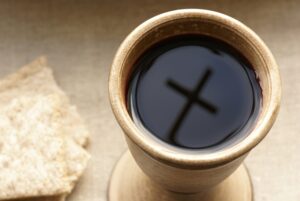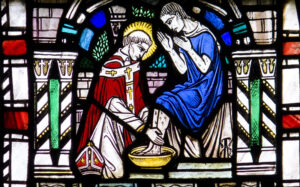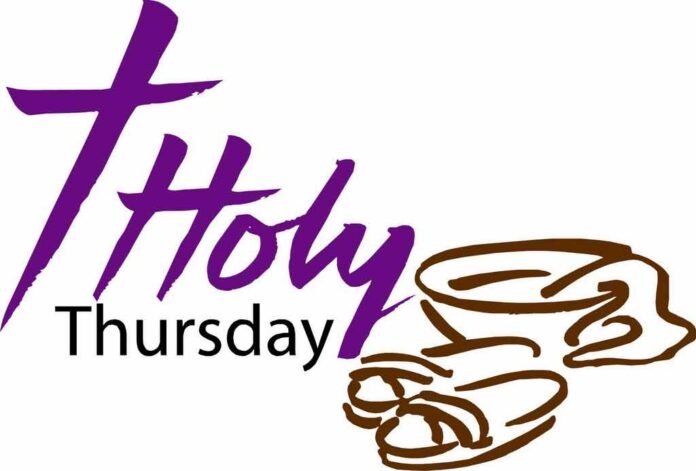During a TV interview a well-known Muslim scholar said that ultimately there is only one sin and all others come from that sin. What would you name as the worst sin? He was quite clear that the greatest sin of all is forgetfulness. According to him if we forget Allah (or for us, God) we forget who we are, what we are about and where we are going. We are like people wandering about without any goal in life, being blown this way and that by whatever prevailing wind blows – pleasure, drugs, money, etc.
I think he is correct. For a year before my mother died she had Alzheimer’s disease, e.g. loss of memory. My mother couldn’t recall who had visited here 5 minutes earlier, when she had eaten last, if she had forgotten to turn off the gas – very dangerous, you’ll agree. It was very hard for us to see her like that. She had forgotten the most important things, through no fault of hers.
 Tonight’s feast, the celebration of the institution of the Lord’s Supper is all about remembering. Remembering who God is, who we are, what we are called to be. Above all it is a call to gratitude or to thanksgiving which is the Greek word for Eucharist. In the first reading, the Jews are warned not to forget one of the greatest events in their history – the Passover Meal. This meal is still for Jewish communities around the world a commemoration of the Jews as God’s people, namely their liberation from slavery in Egypt. For us as Christians it is a re-enactment of our Christian Passover from slavery, the slavery from sin to the freedom of the children of God.
Tonight’s feast, the celebration of the institution of the Lord’s Supper is all about remembering. Remembering who God is, who we are, what we are called to be. Above all it is a call to gratitude or to thanksgiving which is the Greek word for Eucharist. In the first reading, the Jews are warned not to forget one of the greatest events in their history – the Passover Meal. This meal is still for Jewish communities around the world a commemoration of the Jews as God’s people, namely their liberation from slavery in Egypt. For us as Christians it is a re-enactment of our Christian Passover from slavery, the slavery from sin to the freedom of the children of God.
On the night before he died Jesus celebrated the Last Supper, which became our Eucharist. The account is taken from John’s gospel. John himself does not have a Last Supper scene in his gospel, rather he assumes the Christians know about it and so he interprets the meaning of the Last Supper for us. The love of Jesus for us in giving his life and in instituting the Eucharist is bound up with the idea of service – the washing of the feet. This was the work of a slave at the time of Jesus, but Jesus the Lord and Master tells us that leadership among his followers is a leadership of loving service. To be a leader, to have authority in God’s church is to serve others in love. It is about serving not in any kind of condescending way but a service among equals.
When Jesus went down on his knees to wash the disciples’ feet Peter was appalled. And he cried out ‘you shall never wash my feet’. Here Peter reveals the mentality of those, and surely we can count ourselves among them at times, that the master never serves but is served and obeyed. But Peter has to learn that in God’s kingdom it is the leader who is the one who serves. It is a message for bishops, priests, religious, parents, teachers, employees, managers, chief executives, in fact for all of us. And yet most ordinary people I know do this, parents in taking care of their children or aging parents, mothers preparing meals, fathers trying to earn enough to take care of their families, young people in voluntary organisations helping the old, sick, etc.

If God got down on his knees before you or me here tonight would we have the fundamental poverty needed to accept this graciously? So the incredible love and humility of Jesus in getting down on his knees at the last Supper was just another expression of what he did on the Cross the next day. Each action was a total offer of love, self-sacrifice and service for us.
The spirit of Holy Thursday is a spirit of self-acceptance. Simply because, first of all, the spirit of Jesus on Holy Thursday was precisely that: the acceptance of what Good Friday would bring. It involves all that is still to come in our lives, not just the Good Fridays, but the Holy Saturdays, the Easter Sundays and afterwards. Indeed it involves every aspect of our vocation.
Jesus ‘yes’ on Holy Thursday was essentially no different from what occurred on Good Friday, it was only the outer expression of the inner ‘yes’ that Jesus always gave to his Father. His ‘this is my body given for you’ of the Last Supper on Holy Thursday was in essence no different from the ‘yes’ which he physically lived on Good Friday. Obviously, Good Friday was a very dramatic, humiliating and painful living out of the consequences of his ‘yes’.
Jesus always said ‘yes’ to the Father. Whether he was working in the carpenter’s shop or instituting the Last Supper, or hanging on the Cross. For Jesus, it was always ‘yes’ to his Father.
“Lord Jesus, we praise and thank you for your great humility, for getting down on your knees before the apostles to wash their feet. Help us to follow your example of loving, humble service too. Amen”
Fr Jim Kirstein SMA

